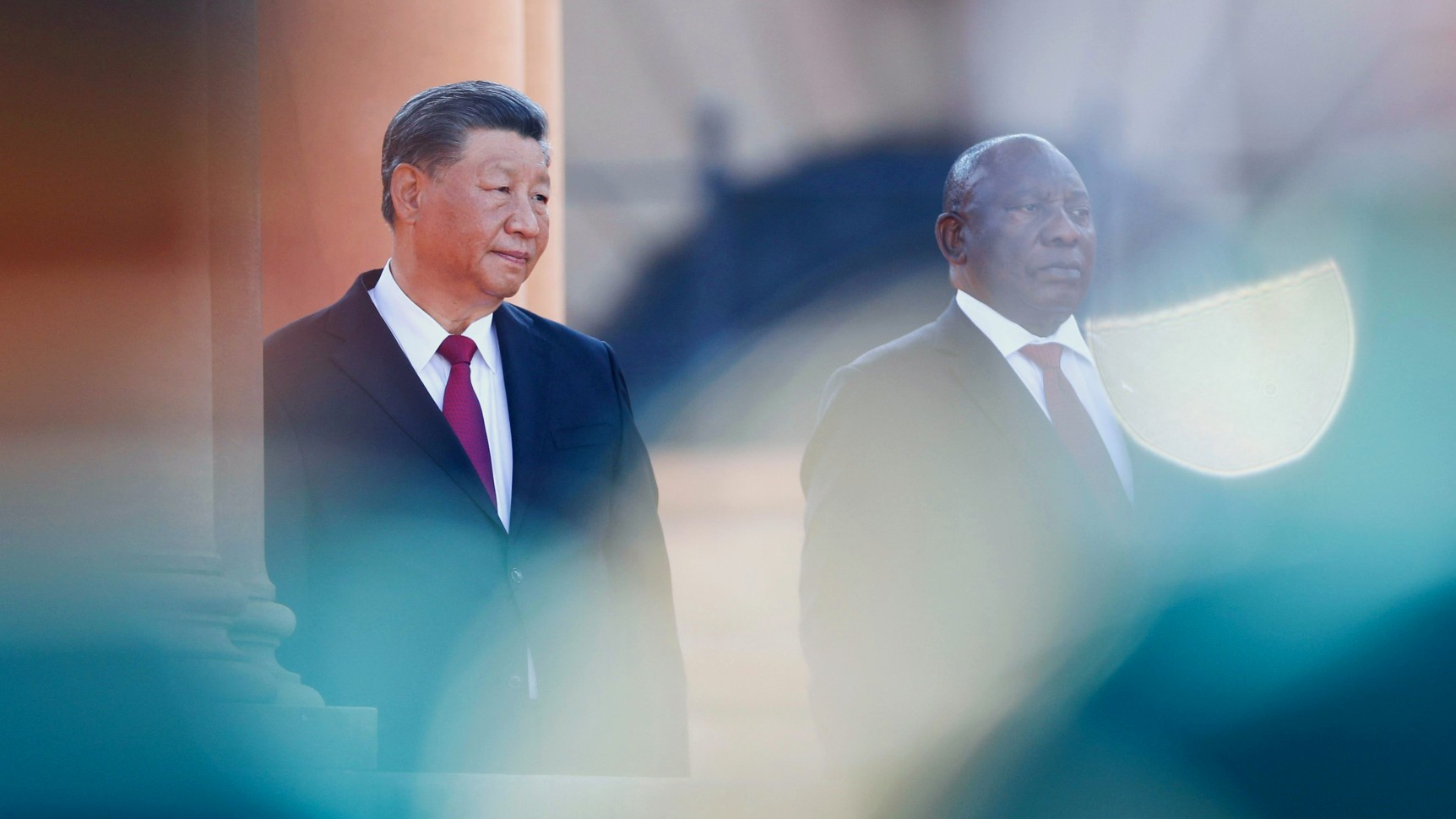Can Brics replace the G7 in new world order?
China and Russia pushing for expanded bloc to rival West politically as India and Brazil pursue economic interests

A free daily email with the biggest news stories of the day – and the best features from TheWeek.com
You are now subscribed
Your newsletter sign-up was successful
The leaders of Brazil, India, China and South Africa kick off a three-day summit in Johannesburg today billed as the most important meeting of the Brics nations in a decade.
Russian President Vladimir Putin, currently the subject of an international arrest warrant, is expected to appear via video link.
The acronym Bric – which stood for Brazil, Russia, India and China – was first coined in 2001 by Jim O’Neill, then chief economist at investment bank Goldman Sachs, to describe a group of emerging economies expected to sustain a prolonged period of growth.
The Week
Escape your echo chamber. Get the facts behind the news, plus analysis from multiple perspectives.

Sign up for The Week's Free Newsletters
From our morning news briefing to a weekly Good News Newsletter, get the best of The Week delivered directly to your inbox.
From our morning news briefing to a weekly Good News Newsletter, get the best of The Week delivered directly to your inbox.
But what may have started as “a marketing ploy to encourage investors has grown into a platform for intergovernmental cooperation similar to the G7”, said DW. In 2009, the four nations met for their first summit in Russia, and a year later South Africa was invited to join, adding the “s” to Brics.
Yet as the non-Asian Brics economies stagnated in the 2010s, “the grouping quickly lost momentum”, issuing “garbled communiqués about the perfidious West – which the perfidious West would promptly ignore”, reported The Economist.
“The Brics looked dead,” it said. “And yet the bloc lives.”
What did the papers say?
Ahead of the 15th Brics summit, tensions have been mounting between the two most influential members, India and China, over whether the group should be a “non-aligned club for the economic interests of developing countries, or a political force that openly challenges the west”, said the Financial Times.
A free daily email with the biggest news stories of the day – and the best features from TheWeek.com
China – along with Russia – is pushing for an expanded bloc to become a full-scale rival to the G7 and able to challenge America’s dominance, said The Times, while India and Brazil “want to ensure it does not become merely a west-knocking bloc or mouthpiece for Beijing”.
The invasion of Ukraine, which the likes of China and India have failed to condemn, has revealed a new reality that the Brics now represents “many of the biggest swing voters in geopolitics”, said The Economist.
What also unites them, said Al Jazeera, is that they are all “giant economies, with even bigger populations and still greater ambitions”.
The five Brics nations make up 40% of the world’s population and now have a combined GDP larger than that of the G7 in purchasing power parity terms. They are responsible for 26% of global GDP and yet still feel under-represented in international economic institutions such as the International Monetary Fund (IMF).
On top of “grievances over such imbalances” are “growing concerns in the Global South that the US could weaponise the dollar through sanctions the way it has against Russia”, said Al Jazeera. Calls for de-dollarisation and the introduction of a common Brics currency are unlikely to gain traction, said the FT, but the summit could focus on seeking an agreement that members should “increasingly settle trade between each other in their local currencies”. There will also be a push to open up the Brics’ Shanghai-based New Development Bank – set up as a rival to the IMF – to new members.
What next?
While all countries will try to put on a show of unity this week, “a geo-economic struggle is brewing”, said Politico. “Whereas China seeks to expand its geopolitical heft by adding new members to rival Western-led blocs, countries like Brazil and India are more circumspect.”
How the Brics expands will go a long way to determining its strategic and economic priorities in the coming years. Dozens of nations have reportedly expressed an interest in formally joining the bloc, including Argentina, Mexico, Nigeria, Egypt and Saudi Arabia.
“Xi Jinping is not trying to out-compete America in the existing liberal international order dominated by the US,” said Steve Tsang, director of the SOAS China Institute at the University of London. “His long-term goal is to change the world order into a Sino-centric one,” CNN reported.
The end result will probably be somewhere in between. The clout of Brics nations “is likely to grow but the bloc is much more likely to offer piecemeal economic and diplomatic alternatives to the US-led global order than to dramatically replace it”, Al Jazeera said.
The man who originally coined the phrase, now Lord O’Neill of Gatley, has said the bloc had been “a big disappointment” that had failed to convert its growing economic might into significant political clout, according to The Times.
That may have been true of the original Brics nations but an expanded bloc could yet prove him wrong.
-
 6 exquisite homes with vast acreage
6 exquisite homes with vast acreageFeature Featuring an off-the-grid contemporary home in New Mexico and lakefront farmhouse in Massachusetts
-
 Film reviews: ‘Wuthering Heights,’ ‘Good Luck, Have Fun, Don’t Die,’ and ‘Sirat’
Film reviews: ‘Wuthering Heights,’ ‘Good Luck, Have Fun, Don’t Die,’ and ‘Sirat’Feature An inconvenient love torments a would-be couple, a gonzo time traveler seeks to save humanity from AI, and a father’s desperate search goes deeply sideways
-
 Political cartoons for February 16
Political cartoons for February 16Cartoons Monday’s political cartoons include President's Day, a valentine from the Epstein files, and more
-
 How are Democrats turning DOJ lemons into partisan lemonade?
How are Democrats turning DOJ lemons into partisan lemonade?TODAY’S BIG QUESTION As the Trump administration continues to try — and fail — at indicting its political enemies, Democratic lawmakers have begun seizing the moment for themselves
-
 How did ‘wine moms’ become the face of anti-ICE protests?
How did ‘wine moms’ become the face of anti-ICE protests?Today’s Big Question Women lead the resistance to Trump’s deportations
-
 How are Democrats trying to reform ICE?
How are Democrats trying to reform ICE?Today’s Big Question Democratic leadership has put forth several demands for the agency
-
 Why is Tulsi Gabbard trying to relitigate the 2020 election now?
Why is Tulsi Gabbard trying to relitigate the 2020 election now?Today's Big Question Trump has never conceded his loss that year
-
 Trump’s ‘Board of Peace’ comes into confounding focus
Trump’s ‘Board of Peace’ comes into confounding focusIn the Spotlight What began as a plan to redevelop the Gaza Strip is quickly emerging as a new lever of global power for a president intent on upending the standing world order
-
 Will Democrats impeach Kristi Noem?
Will Democrats impeach Kristi Noem?Today’s Big Question Centrists, lefty activists also debate abolishing ICE
-
 Do oil companies really want to invest in Venezuela?
Do oil companies really want to invest in Venezuela?Today’s Big Question Trump claims control over crude reserves, but challenges loom
-
 A running list of US interventions in Latin America and the Caribbean after World War II
A running list of US interventions in Latin America and the Caribbean after World War IIin depth Nicolás Maduro isn’t the first regional leader to be toppled directly or indirectly by the US